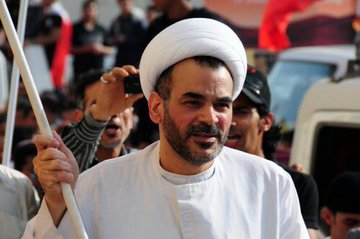Sheikh Mohamed Habib al-Miqdad, a prominent Bahraini-Swedish social activist and religious figure, is currently still serving his prison sentence at Jau prison. He is a member of the prominent Bahrain 13, a group of activists who were arrested for their participation and leading role in the 2011 pro-democracy protests. Sheikh Mohamed was tortured and abused following his arrest and is still suffering the repercussions to this day.
Sheikh Mohamed was first arrested in August 2010, prior to the 2011 protests, for criticizing the government. He was facing charges for practicing his right to freedom of expression. During the arrest, officers tortured Sheikh Mohamed severely. They electrocuted him and left him in solitary confinement for 2 months. During the trial, he was able to show more than 50 traces of electric shocks on his body and presented evidence that a member of the royal family also tortured him. He was also forcibly disappeared and wasn’t able to contact his family or lawyer.
Sheikh Mohamed was later released in late February 2011, only to be arrested a month later, on 1 April 2011, for criticizing the government during protests. Between 50 to 60 National Security officers in civilian clothing arrested Sheikh Mohamed from the house he was staying in, without presenting an arrest warrant. They dragged him, stripped him naked, and beat him all over his body while he attempted to protect himself. They also verbally abused and insulted him. He was then transferred to the al-Qalaa Prison, an underground prison. During his transportation, officers also abused and insulted him.
During interrogations, officers abused and severely tortured Sheikh Mohamed further. They hung him upside down and beat his legs and the soles of his feet with hoses for many hours. They also made him sit naked for extended periods of time and deprived him of sleep. They sexually assaulted him with sticks. Officers also forced Sheikh Mohammed to gargle with his own urine after he was taken to a hospital for treatment. Moreover, they electrocuted his whole body and his genitals. Prison officials spat in Sheikh Mohamed’s mouth and forced him to swallow. They also forced him to kiss their shoes and pictures of the king. Due to the intensity of the torture, he used to lose consciousness. When that happened, officers would spray him with water so he would wake up. Sheikh Mohamed would wake up terrified and surrounded by officers.
Sheikh Mohamed was able to identify some of the officers who tortured him. He also stated that a member of the royal family participated in the torture. On the second day after his arrest, he was handcuffed and blindfolded, when Nasser Bin Hamad, the king’s son, beat him and tortured him. He beat him violently on the right side of his head and dropped him to the ground. When fell to the ground, officers would lift him and beat him “until blood ran all over his body”.
Before his court hearing, officers tortured Sheikh Mohamed to force him to remain silent about the ill-treatment he was subjected to while held in detention. He was not allowed to meet with his lawyer before the trial, and during the court session, he was not permitted to speak. Furthermore, his request for an interview with the judges beforehand was dismissed. On 22 June 2011, Sheikh Mohammed was sentenced to a total of 68 years in prison on charges of inciting attacks on policemen during sermons given in the Pearl Roundabout, plotting to overthrow the Bahraini monarchical government, and establishing a terrorist organization abroad. The Swedish government has tried to meet with Sheikh Mohammed, but Bahrain does not recognize his dual citizenship.
In 2013, Sheikh Mohammed was admitted to the hospital due to severe stomach pains as well as difficulty ingesting food. The symptoms began a year prior to the hospitalization, but the authorities reportedly refused to provide him with proper medical treatment. The doctors ruled that the pain was a direct result of the severe torture and injuries to his abdomen and stated that he must undergo further testing. His stomach pain was left to worsen for years due to medical negligence. In 2018, it was reported that the pain in his stomach was severe and led to vomiting.
Furthermore, Sheikh Mohamed is also still suffering from complications in his head and leg due to the torture. However, officers have neglected his condition and he has not yet received the proper treatment. As of February 2021, Sheikh Mohamed was in urgent need of an operation for his hernia, heart surgery, and a urology examination. However, authorities have denied him the needed treatment, using the Covid-19 pandemic as an excuse. After two years of suffering, he finally underwent these surgeries on 24 February 2021.
The torture and abuse Sheikh Mohamed endured during interrogation is a clear violation of the Convention against Torture and Other Forms of Cruel, Inhuman or Degrading Treatment or Punishment (CAT) and the International Covenant on Civil and Political Rights (ICCPR), both of which Bahrain is a party to. Moreover, he is arbitrarily detained since his arrest and sentencing are the direct result of his exercise of the right to freedom of expression and assembly. Americans for Democracy and Human Rights in Bahrain calls for the immediate and unconditional release of all political prisoners, including Sheikh Mohamed. ADHRB also condemns the torture that political prisoners endure and calls upon the government of Bahrain to respect international law and standards and hold perpetrators accountable. Finally, ADHRB demands the government to uphold its responsibilities and provide Sheikh Mohamed with the required medical treatment.





